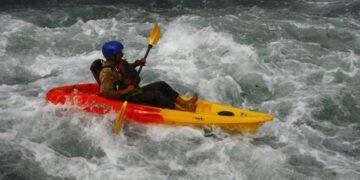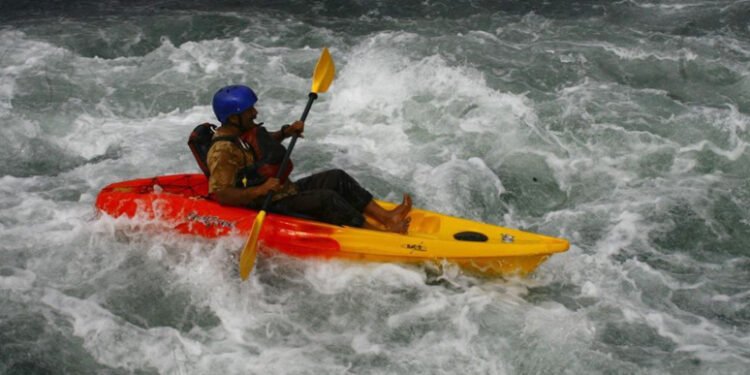Water sports are activities that are performed on or in the water, such as swimming, diving, surfing, water skiing, wakeboarding, kayaking, stand-up paddle boarding, and windsurfing. These activities can be enjoyed in a variety of bodies of water, including lakes, rivers, oceans, and pools. Water sports are often enjoyed as a form of recreation and exercise, and can be a great way to cool off during hot summer months. It’s important to follow safety guidelines and use proper equipment when participating in water sports to prevent accidents and injuries.
- Wear a life jacket: It’s important to wear a life jacket while participating in any water sport, regardless of your swimming ability. This is especially important when engaging in activities such as kayaking, stand-up paddleboarding, or wakeboarding.
- Stay hydrated: Drinking plenty of water before, during, and after water sports activities is essential to prevent dehydration. Bring a reusable water bottle with you to the beach or on the boat.
- Protect your skin: Apply sunscreen with at least SPF 30 before heading out into the sun, and reapply every two hours. Wear a hat and sunglasses to protect your face and eyes from the sun’s harmful rays.
- Check the weather: Check the weather forecast before heading out on the water, and avoid going out if there are thunderstorms or strong winds.
- Know your limits: Be aware of your limits and don’t push yourself beyond them. Start slowly and gradually increase the difficulty level of your activities.
- Be aware of currents: If you’re swimming in the ocean, be aware of the currents and riptides. These can be dangerous and pull even the strongest swimmers out to sea.
- Have a buddy system: Always have a buddy with you when participating in water sports. This will ensure that you have someone to help you in case of an emergency.
- Check your equipment: Before heading out on the water, check your equipment to make sure everything is in good working order. This includes your life jacket, paddles, boards, and any other gear you might be using.
- Know the rules: Familiarize yourself with the rules and regulations of the waterway you’ll be using. This includes speed limits, no-wake zones, and other safety regulations.
- Take lessons: If you’re new to water sports or want to improve your skills, take lessons from a qualified instructor. This will help you learn the proper techniques and safety procedures for your chosen activity.

Avoid alcohol: Never drink alcohol before or during water sports activities. Alcohol can impair your judgment and reaction time, increasing the risk of accidents and injuries.
Know your swimming ability: Be honest with yourself about your swimming ability and choose water sports activities that match your skill level. If you’re not a strong swimmer, consider taking swimming lessons before participating in water sports.
Check the water quality: Before swimming in lakes or other bodies of water, check for any advisories or warnings about water quality. Swimming in contaminated water can cause illness and infections.
Have a plan: Before you head out on the water, make sure someone knows where you’re going and when you plan to return. Carry a cell phone or other means of communication in case of emergency.
Take a safety course: If you’re new to water sports or want to brush up on your skills, consider taking a safety course. Courses like the American Red Cross Water Safety course teach important skills like CPR, first aid, and how to respond to emergency situations while on the water.



















